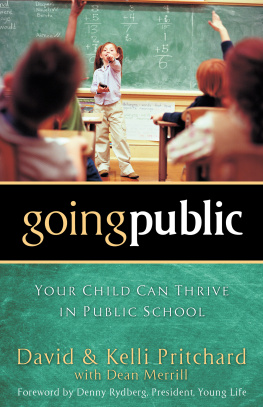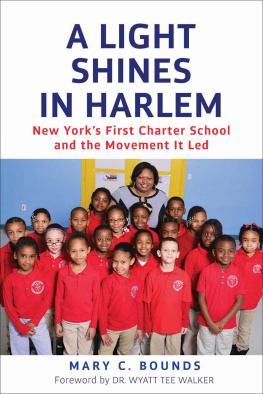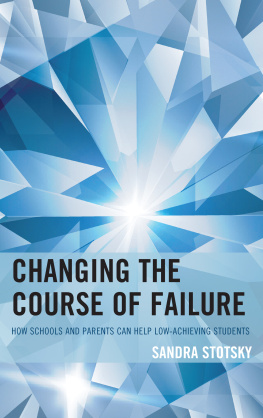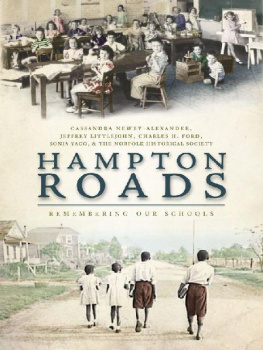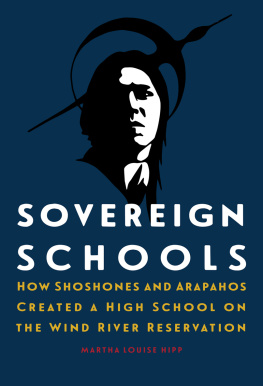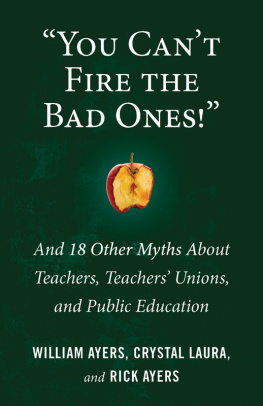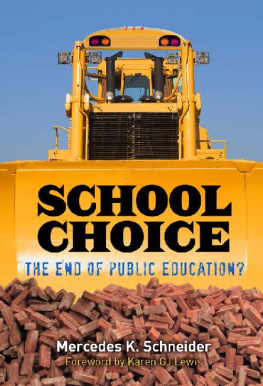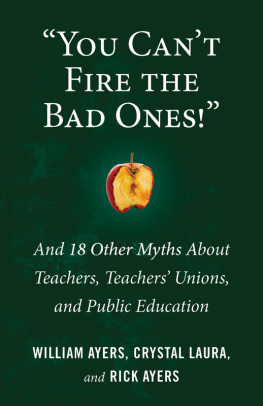Contents
Guide

Marko Demantowsky (Ed.)
Public History and School
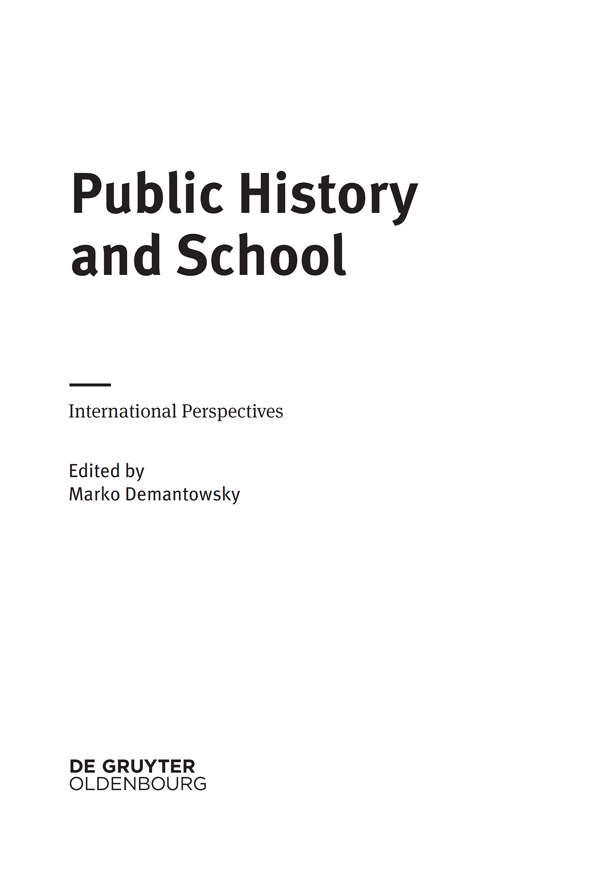
ISBN 978-3-11-046368-2
e-ISBN (PDF) 978-3-11-046613-3
e-ISBN (EPUB) 978-3-11-046408-5

This work is licensed under the Creative Commons Attribution-NonCommercial-NoDerivatives 4.0 License. For details go to http://creativecommons.org/licenses/by-nc-nd/4.0/.
Library of Congress Control Number: 2018953613
Bibliografische Information der Deutschen Nationalbibliothek
Die Deutsche Nationalbibliothek verzeichnet diese Publikation in der Deutschen Nationalbibliografie; detaillierte bibliografische Daten sind im Internet ber http://dnb.dnb.de abrufbar.
2018 Walter de Gruyter GmbH, Berlin/Boston
The book is published with open access at www.degruyter.com.
Cover image: Cultural tradition simulation for sale, USA 2008, by Sandra Nahdar
www.degruyter.com
Preface
The state-guaranteed giant institution called school, which exists worldwide, is one of the most successful projects of modernity, especially when it is offered for free and made compulsory for all. What marks the gradual emergence of this immensely expensive governmental project since the 18th century is characterised by the specific interests that fit partially within an ecclesiastical and military tradition. There was a specific purpose behind the success of the establishment of schools as comprehensive obligatory institutions or, if you like, as a collective long rite de passage . This purpose was the internal integration of the newly emerging nation states and the foundation of coherence in the face of diverse religious, linguistic, social and scenic identities.
This important task was achieved through the so-called mind-shaping school subjects, namely historically formatted instruction in national literature, Christian religion, and, last but not least, history. In this way, from the beginning, schools have played a key role in the enforcement of national identity in an assertive way, against the traditional collective and as historically as linguistically far-reaching self-understandings of a Saxonian Vogtlnder, a member of the Polish Catholic community in Berlin, a free imperial city citizen of Dortmund, or a free East Frisian farmer and so on. These traditional and regional, linguistic, religious limited self-understandings could only appear as particular in the mirror of the new idea of integrated major nations that cover up a thousand cultural differences in favour of an idea of vaulting unity (whatever its character: political, ethnic, cultural). For the new national alignments, the establishment of the new state-guaranteed school systems was as effective as the almost same-time construction of the railway systems.
Whoever talks about the temporal dynamics of and changes in public history or history culture, politics of history, culture of remembrance, etc. cannot but consider an essential actor in their frame of reference: the nation, which is first of all culturally embedded in the constituent parts of the school system as a whole. These parts are the curricula, teaching aids, professional actors, authorities, traditions, generations, discourses, rituals and disciplinary regulations. This applies, of course, primarily to all forms of history teaching.
Just as history textbooks were once called Autobiographies of Nations (Wolfgang Jacobmeyer), national self-understanding. It is the essential laboratory of public history. This is the case both historically and in present times. School is a symbolic place where the continuous negotiation of discourse power is evident. Show me the textbooks and Ill explain the zeitgeist.
No wonder then that school public history also affects other fields of instruction and socialising institutions: school classes visit museums, medieval reenactment sites or cinemas. The archives, heritage sites or memorials have well-established educational departments. How much do the different actors actually know about each other? Are they aware of the exemplary and long-lasting character of school education about national public histories? The authors of this book are working on these emerging questions and provide some answers to them.
The following volume with its contributors from 10 countries opens the framework theme of the book in four sections.
In his detailed keynote chapter, the editor undertakes to restructure the terminological field, which is internationally referred to as Public History, but also uses terms such as Cultural Heritage, Collective Memory, Culture of Remembrance or History Culture etc. He expands on current ways of understanding the term Public History and the core characteristics that make up this field of practice and research. This is done without an exclusive reference to or focus on schools, but rather in a general and, for some, quite a radical way.
This is followed by four chapters with a total of 14 contributions. These four chapters aim to systematically explore this volumes field of inquiry. Accordingly, it addresses
- how public history could be treated in history lessons,
- how schools themselves become the subject of public history,
- how history education? policy affects public history in schools, and, finally,
- it takes a cautious look into the possible future of the relationship between public history and school.
The volume pursues a systematic interest, is structured according to subject matter, and has emerged from a lively discussion lasting several days. All authors of the volume met in Basel in autumn 2015 to discuss these questions on a conference (#PHI15). They discussed these problems in public lectures, informal discussions and courses for the students at my university. I would like to take this opportunity to thank the Swiss National Fund (SNF) and the Educational School FHNW (Basel, Brugg-Windisch) for their generous financial support of this event.
Our open-access blog-journal Public History Weekly has discussed the relationship between history educators and public historians time and again in recent To me, however, this does not seem to be a problem at all provided one does not understand public history as a distinct and jealously-guarded academic discipline. Rather, it should be seen as a transdisciplinary and open field of research, inquiry and area of work, which depends largely on combining expertise from very different scientific backgrounds for the benefit of expanding knowledge and for the encouragement of a culture of debate.
The quality review of this volume was conducted through an Open Peer Review (OPR) organized by the publishing house in June and July 2018.
As the editor of this volume I have many supporters to thank: first of all, Dr. Jan Hodel and Simone Dietrich, who worked tirelessly on the organisation of the International Public History conference in 2015; Samuel Burri, who played an important role in supporting the editing of the contributions to this book; and Dr. Elise Wintz and Rabea Rittgerodt of De Gruyter Oldenbourg for their persistent patience together with their professional and friendly editorial staff. Nevertheless, I am responsible for any remaining editorial problems.
Basel and Dortmund, June 2018
Marko Demantowsky
Keynote
Marko Demantowsky
What is Public History


